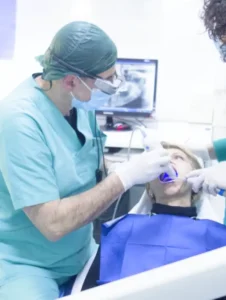Treatment coordinators are an important part of the orthodontic or dental care team. They perform a wide variety of roles to support patients and their families through the dental treatment experience and manage communication and cooperation between patients, doctors, and support staff.
While not every dental office employs treatment coordinators, every office will have a support staff that will take care of some or all of the duties of a treatment coordinator. This position requires a variety of skills: people skills, management and organizational skills, and comfort with a fast-paced, high-energy environment.
If this sounds like the job for you, read on to find answers to all your questions about becoming an dental or orthodontic treatment coordinator.
Dental Treatment Coordinator Job Overview
The treatment coordinator’s primary responsibility is patient experience: they serve as the patient’s concierge throughout the dental care experience.
The treatment coordinator (or TC) ensures that the patient and the patient’s family are kept informed and included in all matters of the dental treatment. The TC’s role is especially important at the beginning of care: treatment coordinators meet with patients and their families for new patient examinations, to gather medical history, discuss treatment options, and answer all payment questions.
Once treatment begins, treatment coordinators communicate with patients and their families to keep track of payment schedules, appointments, and post-treatment follow-up care.
Some duties include:
- Gathering information from new patients
- Introducing patients and families to the dental office and treatment team
- Educating patients and families on treatment options, costs, and setting up payment plan
- Communicating with patients/families for appointments, payment schedules, etc
- Submitting paperwork to insurance providers
- Communicating patient needs and questions to dentist and staff
Treatment coordinator positions may be full-time or part-time, depending on the dental office. Whether you’re full or part time will impact whether you are paid hourly or as an annual salary.
According to the employment data site Glassdoor, orthodontic or dental treatment coordinators can expect to make an average of $27/hour, or a salary of $39,438. This is an average of salaries from across the country: pay ranges considerably depending on the region where you live, the experience of the individual, and more.
Many orthodontist or dental offices offer benefit packages for treatment coordinators, especially if they are full-time employees. Be sure to ask about benefits, including health insurance and paid time off, when you are seeking a position as a treatment coordinator at a new office.
Qualities of a Great Treatment Coordinator
Treatment coordinators are the liaison between patients and their families and the dental treatment team. For that reason, the position is fundamentally a people-person job. Individuals who thrive in a highly social, fast-paced, energetic environment are likely good fits for treatment coordinator positions.
Treatment coordinators also manage multiple cases at once, so the position requires excellent organizational skills.
According to the industry magazine Dental Economics, the following skills help to make a great treatment coordinator:
- Excellent communication skills
- Poise and professional demeanor
- Organized and systematic
- Ability and patience to navigate insurance providers and other communications
- Self-confidence without an ego
- Positive attitude
- Ability to think quickly and adapt to changing situations
What is Required to Become an Orthodontic or Dental Treatment Coordinator?
To earn a position as treatment coordinator, either dental or orthodontic, applicants typically need a high-school diploma. This job does not require an advanced degree, but most offices will require at least a high-school diploma or the GED equivalent. There is no certification or licensing necessary to become a treatment coordinator, and training generally takes place on the job, by following another treatment coordinator in the office.
You will also have to be 18 years of age and legally permitted to work in the United States.
Depending on the dental office, the TC position may also require some work experience, preferably in customer service. Many treatment coordinators start out as office assistants and rise the ranks to become treatment coordinators.
How to Find an Orthodontic or Dental Treatment Coordinator Job
If you’re ready to pursue a career as a treatment coordinator, it’s time to start looking for a job! There are multiple ways to find a treatment coordinator position in your area.
- Online job sites like Indeed, ZipRecruiter, Craigslist, or CareerBuilder. Many dental practices post on these sites seeking new recruits. Plus, you can filter for preferences like part or full-time work, minimum pay, and proximity to your home, to ensure you’re finding the right fit for your lifestyle.
- Contact practices in your area. Do an online search for local dental practices, and give them a call, send an email, or even drop by to inquire about any open positions. They may not be hiring at the moment, but a proactive approach might make you an appealing candidate when a position opens.
- Search dental job boards like dentalpost.net: these online sites are exclusively for positions in the dental field, which can make for an easier search experience.
- Ask your friends and family in the dental field. Do you know anyone currently working in the dental industry? Ask about possible positions in their office, or if they know other nearby practices that are hiring. Having someone vouch for your personality and responsibility can also go a long wat when it comes to getting hired.
Interested in a treatment coordinator with Diamond Braces?
